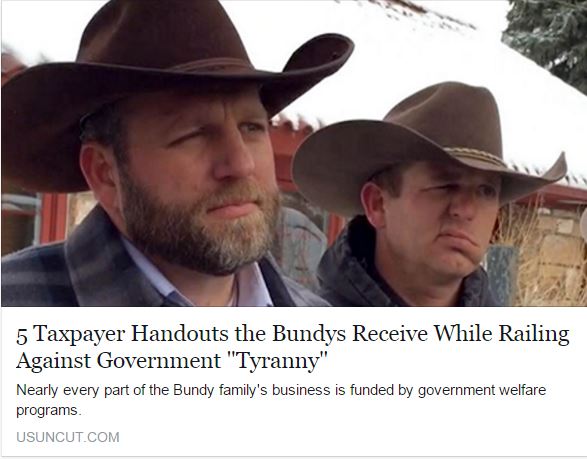What do these guys or other public lands ranchers have to do with wild horses? A lot! Their sense of entitlement makes them believe that the BLM, U.S. Forest Service, and National Parks Service should be at their beck and call. And why not? These government agencies have enabled them for decades. For example:
Ranchers depend on big government assistance to keep livestock safeThe Bundys and other ranchers would have very little livestock to feed if it weren’t for the “animal damage control” program, in which federal employees kill off the nearby predators that present a danger to cattle. The Atlantic’s study of this program found that, again, Western ranchers are responsible for a disproportionate amount of taxpayer subsidies compared to the other 39 states:
In 1994 this program cost $55.9 million nationwide, of which roughly $22 million was spent on western livestock operations. The animals killed nationwide with this money included 163 black bears, 293 mountain lions, 1,928 bobcats, 8,973 foxes, and 85,571 coyotes.
~~~~~~~~~~~~~~~~~~~~~~~~~~~~~~~~~~~~~~~~~~
Welfare ranchers are behind the mass removal of our wild horses. The bill for removing and warehousing our wild horses also falls upon us. A large majority of Americans want our wild horses left safe, wild, and free but we have no say.
We have welfare ranchers literally calling for the death of our wild horses.
Larry Gibson, ranch hand for a multi state federal lands cattle rancher had this to say about the Heber Wild Horse Herd, a herd that has a dedicated territory on U.S.Forest Service land...our land:
“So in my opinion, the best thing to with these up here would be remove every one of them. Whether they go to adoption, or, you know, I hate to say it, euthanized or to a slaughter plant," Gibson says. "I mean that sounds kind of harsh, but something has to be done with them.”
http://knau.org/post/heber-wild-horses-legendary-or-problematic#stream/0
At this time the Heber Grazing Allotment is going through the steps that will allow for more cattle to be grazed in and around the dedicated Heber Wild Horse Territory. The Forest Service says the forest is in good condition which would make even more cattle a future possibility, yet they want our wild horses removed.
It the new Heber Grazing Allotment is approved:
Annual Grazing Fee Receipts is estimated to be $6,542 to $10,260.
The amount the improvements for cattle grazing would cost
Cost from new structural Improvements (Total Cost) $523,956
Cost of non-structural improvements (Total Cost) $3,702,304
That would mean over $4,000,000.00 will be needed if the grazing allotment is approved. It is possible that the entire cost for the improvements could be passed on to the American tax payers.


 RSS Feed
RSS Feed
